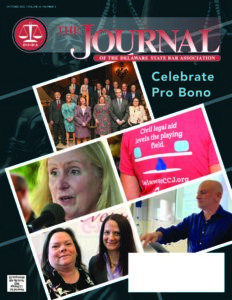How I got into Legal Aid:
I’ve always had an interest in social justice issues, going back to my college days at the University of Delaware. I remember working on then Senator Biden’s first Senate reelection campaign in 1978 and admiring his commitment to assisting Delawareans and his passion for helping “the little guy”. After college, I worked at a law firm in Philadelphia where I was introduced to some of the nuts and bolts of private practice, then I moved back to Delaware to work for almost five years at JPMorgan (Delaware) at the beginning of the influx of many of the large commercial banks. However, I’d maintained an interest in attending law school and
remembered that my grandmother, who had worked as a teacher in a one-room schoolhouse in Ohio, had often reflected that she wished she had become a lawyer. I realized that there was no time like the present and, if I wanted to accomplish that dream, I’d better get started! I attended Delaware Law School and upon graduation worked in private practice for 12 years, at the Law Offices of Richard Rago, where I learned a lot about various practice areas – probate, real estate and criminal defense work, to name several. But I still had an interest in social justice in the back
of my mind and started working for LSCD, in the Dover office, in 2003. I transferred to the Wilmington office in 2005 and became Litigation Director in 2011.
What are you most excited to tackle as LSCD’s Executive Director?
We’re certainly working in uncharted territory now and the demand for legal representation of low income Delawareans will soon be at record levels. It’s been a challenge to get our staff of twenty-five employees up and running remotely, to which I give full credit to my predecessor, Doug Canfield. He worked tirelessly last spring and well into the summer to make sure our staff had the tools necessary to accomplish the transition to remote work. As we anticipate that our office will work remotely for the foreseeable future, well into 2020, I look forward to continue working with our community partners to find ways to meet the challenges presented by the pandemic. An unexpected consequence of the pandemic was that it highlighted some drawbacks to the legal system that had been faced by low income Delawareans even prior to last March, such as access to resources and logistical issues of representation and participation facing litigants. Through collaboration with our counterparts at CLASI and DVLS as well as members of many of the social service agencies with which we collaborate we’re now working on several projects to address access to justice issues, with an emphasis on obtaining crucial funding for programs that will benefit our shared client base of low income citizens. LSCD is gearing up to provide representation to tenants in what is expected to be an unprecedented number of eviction cases in the Delaware court system starting in the new year, and we continue to see a steady increase in requests for assistance in obtaining Unemployment Compensation benefits. Mortgage foreclosure defense is also a practice area of our firm and, as the negative financial impact of the pandemic continues, we anticipate a large increase in requests for assistance with mortgage modification relief and bankruptcy representation to help clients save their homes from foreclosure. Our staff, from attorneys and paralegals to our support staff members, many of whom work on site in our two office locations once or twice a week to keep things running smoothly while working remotely the balance of the week are all committed to providing strong and effective advocacy and legal representation to vulnerable Delawareans.
